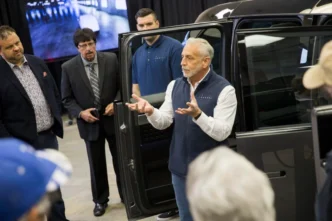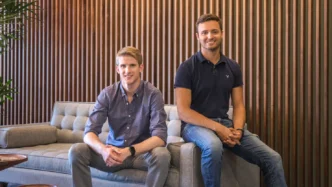Daniel Ruskin kickstarted his engineering career at just 14, landing a role at Coinbase after teaching himself to code and diving into freelance gigs he found on Reddit. Too young to even open a bank account, he accepted payments in bitcoin and quickly caught the eye of Coinbase leadership after sending a cold email to the company’s head of operations.
While he didn’t write Coinbase’s earliest code, Ruskin was instrumental in scaling the platform’s infrastructure, building key systems that took it from its earliest versions into a functioning exchange.
After four years at Coinbase, he stepped away to pursue higher education. He attended college, went on to law school, and built a few startups along the way—including one in election security that earned him his first patent.
Frustrated by the complexity of the patent process, Ruskin launched Inventex in December 2024. Based in Salt Lake City, the startup aims to make it easier and faster for companies to prepare and file patent applications. It uses AI agents paired with licensed attorneys to streamline and accelerate what’s traditionally been a slow and opaque legal process.
Ruskin, now 26, believes Inventex can help companies get to “patent-pending” status up to 10 times faster than a traditional law firm—reducing a months-long journey down to just days.
The idea quickly resonated with investors. Within a month of launching, Inventex secured $2.4 million in pre-seed funding. The round was co-led by Conviction Capital, Cambrian Ventures, and Coinbase co-founder Fred Ehrsam, with participation from Boost and others. The capital was raised through SAFEs at a $10 million valuation.
Inventex’s process begins by taking in technical documentation from clients—code, specs, and designs. Its system identifies what qualifies as patentable, comparing the technology to prior art and highlighting the invention’s unique elements. It then drafts and files applications in the U.S. and internationally.
Maksim Stepanenko, a fellow early Coinbase engineer, said he was impressed by Ruskin’s capabilities even back when they were both working on critical payments infrastructure while still in high school. Hearing about Inventex, Stepanenko joined as a small angel investor.
“He’s thoughtful, fast-moving, and unusually good at navigating complex systems,” Stepanenko said. “One of the most quietly impressive people I’ve worked with.”
‘More inbound than we can handle’
Beyond speed, Ruskin says Inventex helps companies create stronger, more defensible patents. Its AI models are fine-tuned to each technical area, with every AI agent specializing in a specific domain. These agents work under the supervision of licensed attorneys who refine their output to ensure compliance and accuracy.
According to Ruskin, the traditional model—selling task-based software to law firms—doesn’t go far enough. Legacy systems are constrained by incentives like billable hours and slow deployment. Inventex flips that approach by offering an end-to-end service optimized for results.
He believes the platform has broader applications too. One current use case involves automating MSPB (U.S. Merit Systems Protection Board) complaints, a process Inventex is helping manage for thousands of recently laid-off federal employees.
“Traditional firms can’t support that kind of workload,” he said.
Though still in early stages, the company has about $250,000 in annual recurring revenue already in the pipeline. Its clients include two public companies and a growing list of startups. One of those, Dirac, allowed Inventex to name them publicly.
“We have more inbound than we can handle,” Ruskin added.
Building unicorns
Ruskin’s track record in fintech has also played a role in his entrepreneurial journey. In 2022, he joined Checkr, a company that provides payment infrastructure for gig workers. There, he helped launch Checkr Pay—a “startup within a startup”—building a full neobank with a team of just three engineers in under four months.
Checkr previously raised $250 million at a $4.6 billion valuation, and Ruskin left in 2023 to complete law school at NYU, where he graduated in the top 10% of his class in 2024.
It was during his time at Checkr that he met Cambrian Ventures’ solo GP Rex Salisbury, who called Ruskin the company’s “highest velocity engineer.” Salisbury pointed out that Ruskin helped build not one, but two unicorns—Coinbase and Checkr—before even finishing his degree.
“At this early stage, you don’t evaluate a company purely on what it is, but on what it can be,” Salisbury said. “Daniel’s speed of execution is what really stands out.”
Making patents more accessible
Since its December launch, Inventex has doubled in size each month. Much of this growth comes from word-of-mouth referrals and partnerships with venture firms. The company charges a subscription fee that covers the entire patent journey—from idea discovery to filing and prosecution.
Currently, Inventex has three full-time engineers and works with several contract patent attorneys.
Its competitors include platforms like Edge and Solve, which offer tools for patent drafting. However, Ruskin believes Inventex’s model stands out by handling the full process.
Before founding Inventex, Ruskin started a company called Motif in July 2024. It had a similar mission but dissolved due to a misaligned co-founder relationship.
Looking ahead, he’s considering offering Inventex’s drafting system as a white-labeled solution for law firms. This would allow them to license the tech and offer clients higher-quality patents, faster.
“Our long-term vision is to flip the ratio of effort in the patent process,” Ruskin said. “Today, 90% of the time is spent on drafting disclosures, and just 10% on strategy. In five years, we see that reversing—drafting will take just 10%, and strategy will be where law firms really add value.”
This shift, he says, could significantly lower the cost of patent filings and make innovation more accessible to startups and inventors of all sizes.













